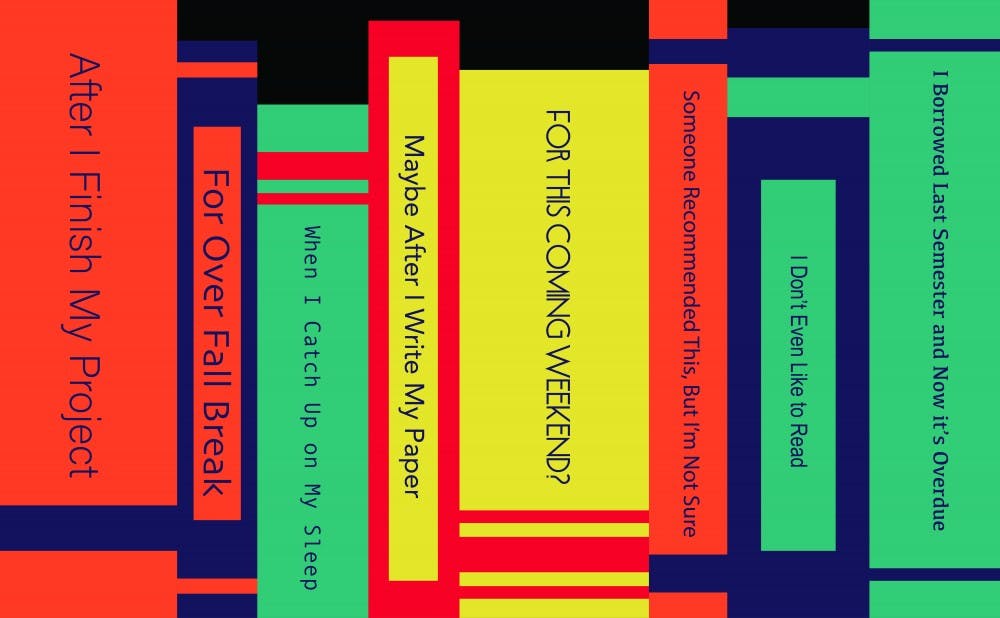Universities and books would appear to be a match made in heaven. Cultural depictions often show college students dressed casually, bespectacled, and in most cases, with a stack of books tucked under their arm, hurrying from classrooms to libraries and back. With Duke being no exception to a world that is busy and hectic, do students still resort to books and leisure reading when they want to escape their packed schedules?
In many of the admissions essays that will soon be sent to Duke, high schoolers will stress their love for reading and how they wish to expand on it upon arriving on campus. Once students come to college, however, only few seem to abide by the mantra of relentless reading they had proclaimed in their essays, and understandably so.
Every night, Duke students flock to their carefully selected study spots, such as the Wellness Center, the deserted tables in West Union or Perkins to plow through the copious chapters and papers assigned by their professors. In the midst of all these pages and other homework, students seem grateful for every minute they can escape this academic paper jungle that Duke can be, whether through social media, Netflix or partying.
“I must admit that I don’t get to read books of my own choosing as much as I’d like while I’m at school, simply due to a more hectic schedule,” said senior Oscar Hong, who is studying computer science.
While he does reserve 30 minutes per day for reading and audiobooks, he said that around two thirds of his yearly leisure reading is done in the summer.
Hong is not alone. Aamir Azhar, said that he only regained the ability to read for leisure after graduating from Duke. The first book he picked up was “Discipline and Punishment” by Michel Foucault.
“Halfway, I got bored, and, realizing I had “Kafka on the Shore” (by Haruki Murakami) on my Kindle, [so I] decided to just start reading that instead,”he said.
“It’s difficult for me to do things in short periods,” said sophomore Anya Parks, who is currently making her way through Gustave Flaubert’s “Madame Bovary.” “ To really enjoy what I’m reading, I need a chunk of hours in which I have no obligations.”
One Duke alumna who certainly sits down to read after the hurly-burly of her work day is Morgan Hoit, who graduated from Duke in 2016, and might be better known under her Instagram alias @nycbookgirl.
Apart from her job as an assistant to a Broadway producer, the former English and Theater Studies major actively blogs about new releases and New York City’s literary scene.
“I didn’t have that much control over my own reading when I was in college and my reading for pleasure was confined to the times when I had more free time,” Hoit said.
At Duke, Hoit managed to read approximately one unassigned book per month; now, she finishes 12 or 13 per month. The sudden boost in reading she experienced after graduating led to the start of her blog. Looking back at her time at Duke, Hoit lauded the skills she acquired in her classes and, although the time for leisure reading was rather scarce, she cited that several of her college friendships originated in conversations about books.
“With the influx of technology we’ve had in the last few decades, people were immediately interested in it, but then reverted back to a love of reading” she said.
Many students felt nostalgic about times when reading felt more like a pleasure than a duty, such as middle school. Most of the respondents said their estrangement from literature began at some point during their high school career, when college applications loomed, and more rigorous classes started demanding their full attention.
This nostalgia carries an element of sadness for some of them, as expressed by senior Anika Mukherji. “Now, reading for fun generally means sacrificing some other work,” she wrote in an email. "I really believe that it is something missing from the academic culture at Duke.”
Mukherji emphasized the distinction between reading as a requirement and exploring literature for the sake of pleasure, which could be strengthened on campus via book clubs or other programs.
The question of reading seems to have struck a chord with many Duke students. Multiple reported that they too once were the “stereotypical bookworms.” Some of them, like senior Miriam Levitin, even recalled reading the entire children’s section in her local library.
Although Duke’s general culture might seem to prioritize job recruiting events, social groups and shiny resumes, students appear unequivocal in their appreciation of literature. Considering the determination and creativity so many of them display on a regular basis, there is ample hope that literary life will regain a larger role on campus sooner or later.
Get The Chronicle straight to your inbox
Signup for our weekly newsletter. Cancel at any time.

